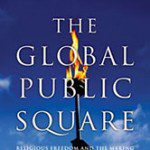Lectionary Reflections for August 25, 2013
Jeremiah 1:4-10
Psalm 71:1-6
Hebrews 12:18-29
Luke 13:10-17
God’s Providence: Abstract or Concrete
God’s call of Jeremiah is one of my favorite Biblical stories. I can relate to the prophet’s dilemma: the prophet is uncertain of his vocation and protests his inexperience and fallibility. He doesn’t think he is up to the task that God has called him to. God responds to his fears, and mine, by saying: “I have been moving in your life from the very beginning. Your life is part of a larger story and I have imagined your vocation and your future. I’ve brought situations into your life and created opportunities for your growth. Your calling is not accidental; it is part of my vision for my people and their spiritual welfare.”
The call of Jeremiah assumes a type of divine providence and decision-making seen also in the story of Esther who is reminded by Mordecai that perhaps she has become queen, “for just such a time as this.” (For more on this week’s lectionary, see the complementary lectionary commentary on Process and Faith: http://processandfaith.org/resources/lectionary-commentary/yearc/2013-08-25/proper-16)
God is near, the words of Jeremiah proclaim. But, is God’s providence abstract and timeless, decided before the beginning of time, or does it emerge in concrete situations where there is dance of divine call and human response, and human call and divine response? At first glance, Jeremiah’s call suggests a timeless or prenatal call, but a deeper look sees the birth and life of Jeremiah as part of the concrete history of a people. God’s providence is in the process, and our openness to God’s grace occurs in real time, not in some predetermined future. Still, we can imagine an arc of providence that begins before we were born.
If God is working in all things, then God may have imagined the birth of a prophetic leader in the context of God’s movements in Jeremiah’s parents’ lives. God may have nurtured them to become the type of parents who would raise a child, sensitive to God’s quest for justice. This same gentle providence may have been at work in the life of Mary of Nazareth. I don’t believe that God chose her in some timeless eternity. I suspect that God, moving through God’s messengers, and finally the angel Gabriel, lured Mary toward an openness to follow the leadings of the Spirit even if they might put her at risk. Was Mary the only woman who could have given birth to Jesus? We simply don’t know. Did others refuse the divine beckoning with all its risk and wonder? No one can answer this question. But Mary said “yes.” God may have been working in her life to deepen her faith so that she might accept a miracle when it came. This did not eliminate her agency nor make her a robotic parent. As the story of young Jesus in the Temple indicates, there was a natural push-pull in the relationship of mother and son.
Providence is gentle, I believe, and increases rather than decreases our freedom and vision of options. When Jeremiah says “yes” to God, a whole world of possibilities emerges. His yes opens him to new and greater divine energies.
Jesus cures a woman on the Sabbath. The religious leaders assume that only certain days are providential. Others are off limits to hospitality and healing. Jesus’ healing acts invite us to see every place as a healing place and every moment as the right moment for creative transformation. Providence is broadcast everywhere without limits or exclusion. This is the day that God has made; this is the day of healing and transformation; and this day is every day.
Providence, the scriptures suggest, is always concrete. This moment in the synagogue, on a Sabbath, might have been the only time divine call and human response would be aligned in such a way that his woman would find a healing. The “now” of healing is always concrete. God vision of Shalom, Wholeness, Love, and Justice, define God’s eternal providence; but the working out of providence is always temporal, fresh, many-faceted, as it emerges from the interplay of God’s vision and our need.
The adventurous preacher can invite her or his congregants to stay awake and then boldly, yet humbly, claim their role in embodying God’s providence in their time and place. This moment could be the right time for personal and congregational transformation.
















